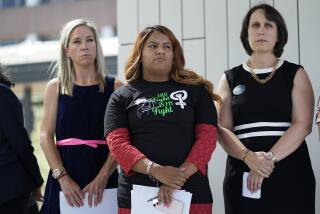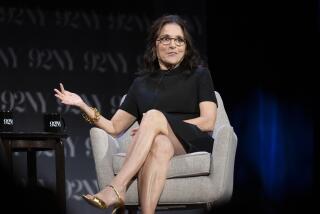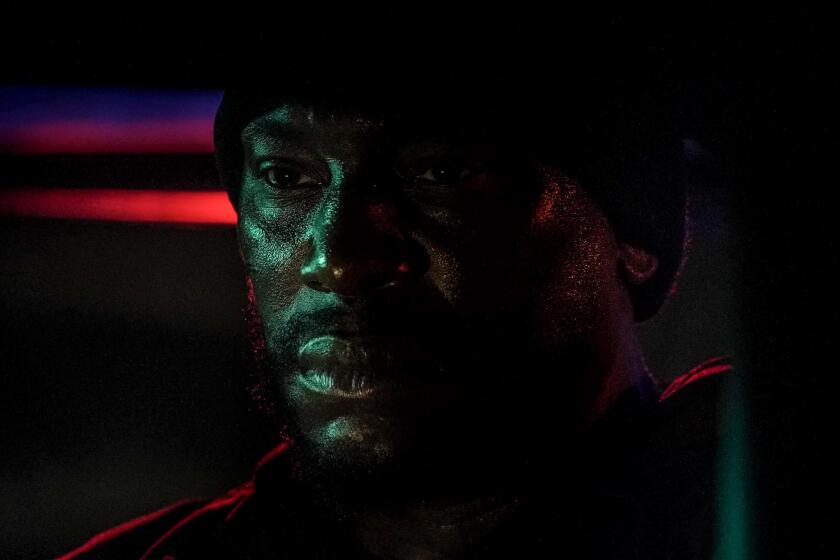The Big Picture: Political idealists offscreen, cynics onscreen
As the presidential campaign moves into high gear, politics is front and center these days in Hollywood. Warner Bros.chief Barry Meyer held a $2,500-a-head fundraiser on Sunday with Michelle Obama as its headliner. Harvey Weinstein just had a $35,800-a-head dinner that raised $2.4 million for President Obama, whom Weinstein dubbed the Paul Newman of American presidents. George Clooney hosted a fundraising dinner here in May that raised $15 million. Spike Lee, “Glee” creator Ryan Murphy and others have been rounding up the dollars at similar events.
These events are put together by actors, executives and filmmakers who genuinely believe in progressive ideals, think that campaigns should be taken seriously and feel that elected officials like Obama can be real agents of positive change. The rationale is always the same: Politics matters. As comedian Bill Maher explained after giving $1 million to the liberal Priorities USA “super PAC” earlier this year: “I’m doing this because I truly believe the difference between a country governed by Barack Obama and one governed by Mitt Romney is worth a million dollars.”
Yet when it comes to the films and TV shows being made nowadays by Hollywood’s same creative community, politics is portrayed as a cynical con game. We’ve come a long way from the idealist ways of “The West Wing,” which premiered during the Clinton administration. Just look at “The Campaign,” a new comedy that made $27.4 million in its opening weekend. It focuses on a how-low-can-you-go congressional race where an airhead politico played by Will Ferrell merrily runs outlandish campaign ads linking his opponent, a mustachioed Zach Galifianakis, to Al Qaeda terrorists because of his facial hair.
PHOTOS: Lessons from the campaign trail
One of HBO’s best shows is “Veep,”a workplace comedy starring Julia Louis-Dreyfusthat’s full of Washington-style blood lust and back stabbing. Politics takes the form of soap opera on the USA Network’s “Political Animals,” with Sigourney Weaver playing a Hillary Clinton-style secretary of State whose dysfunctional family, led by a philandering, Bill Clinton-esque ex-husband, provides a nonstop cavalcade of self-destructive antics.
And let’s not forget “Boss,”the Starz political drama featuring Kelsey Grammer as the profane mayor of Chicago, who uses intimidation and deceit to muscle the city into doing what he wants.
Like “The Campaign,” the TV shows portray modern-day politics as a universe devoid of idealists trying to better the country through public service — and full of venal, manipulative, conniving, wildly narcissistic characters. Everyone is on edge, ready to go ballistic over the flimsiest slight. In “Veep,” when one of Louis-Dreyfus’ aides asks a senator how he would react to the vice president naming an oil company lobbyist to a task force, he icily responds: “I’d probably rip your face off and use your eye sockets as a sex toy.”
I’m not saying anyone should be surprised that Hollywood takes such a snarky view of today’s political landscape. After all, in one recent survey, Congress’ approval rating was so low that it barely registered a notch above Fidel Castro.
But it makes you wonder. Why is there such a disconnect between the way showbiz liberals shower energy, affection — and money — on Obama and other Democratic candidates in real life while portraying them as tawdry, self-absorbed careerists on screen?
For certain, Hollywood has long had an ambivalent attitude toward politics. Every film that seemed full of hard-earned idealism — from”Mr. Smith Goes to Washington”to”All the President’s Men”— has been more than matched by pictures radiating dark, often mordantly funny pessimism, from “All the King’s Men” to “Wag the Dog” and “Bulworth.” But these days, we seem to be in an era of all pessimism, all the time.
To hear “The Campaign” filmmaker Jay Roach tell it, though, most filmmakers and TV writers are anything but cynics. “I like to think of people like Aaron Sorkin or Jon Stewart or myself as disappointed idealists,” Roach told me the other day, seated in his office, his wall adorned with a poster of “All the President’s Men.”
“I’m trying to make films that say — can’t it be better? In a time where people don’t read a lot of books, you’d hope that films could try to shine a light on what could be different.”
Hollywood clearly is reflecting the general cynical mood of the populace. George Clooney is a famously ardent Obama supporter, but his 2011 movie”The Ides of March,”which he directed and costarred in, is an unsettling fable about an idealistic campaign operative whose political hero becomes embroiled in a seamy scandal.
Today’s noisy divisions make it almost impossible to craft stories with any upbeat endings. “Filmmakers are simply responding to four years of gridlock and the most partisan politics anyone has ever seen, especially when it comes to putting party interests above what’s best for the country,” said historian Steven J. Ross, author of “Hollywood Left and Right: How Movie Stars Shaped American Politics.”
“Maybe it looks like a disconnect, but in Hollywood, politics is politics and business is business. People can go to fundraisers and man phone banks, but that’s what you do privately. When it comes to business, you give the public what they want. And if you’re giving the public what they want, you’re probably going to spend a lot of time mocking every politician up on screen.”
For a comedy writer or dramatist, the bad behavior, the chasm between appearance and reality and the sleazeball campaign tactics represent low-hanging fruit.
As Ferrell and Galifianakis were trying to come up with an idea for a film together, they had initially imagined a story line where they were rival beauty pageant coaches. But it became clear pretty quickly that when it came to cheap shots and amoral antics, how could you top politics?
“It’s almost hard to think of a better arena, in terms of taking advantage of the contrasts between two characters,” Roach said. “When it comes to the idea of an opposing dynamic, the down ‘n’ dirty of politics was hard to beat.”
Besides “The Campaign,” Roach has also made a pair of HBO docudramas about politics, including this year’s McCain-Palin campaign story “Game Change.” “My favorite analogy is to professional wrestling,” he said. “You have so many deceptive commercials and smear tactics that it’s gotten to the point where the winner is almost always the best faker or the most outrageous insult artist. It’s what sells in both wrestling and in politics.”
It’s almost painful to watch a film like “The Campaign,” which portrays today’s politics — with hardly any exaggeration — as being the equivalent of a fifth-grade food fight. But we’re at a point where we have to laugh, otherwise we’d cry. And to Roach, that’s exactly the point.
“If it’s painful, it needs to made fun of,” he said. “You get a lot of laughs from painful truths.”
Twitter: @patrickbigpix
More to Read
Only good movies
Get the Indie Focus newsletter, Mark Olsen's weekly guide to the world of cinema.
You may occasionally receive promotional content from the Los Angeles Times.










